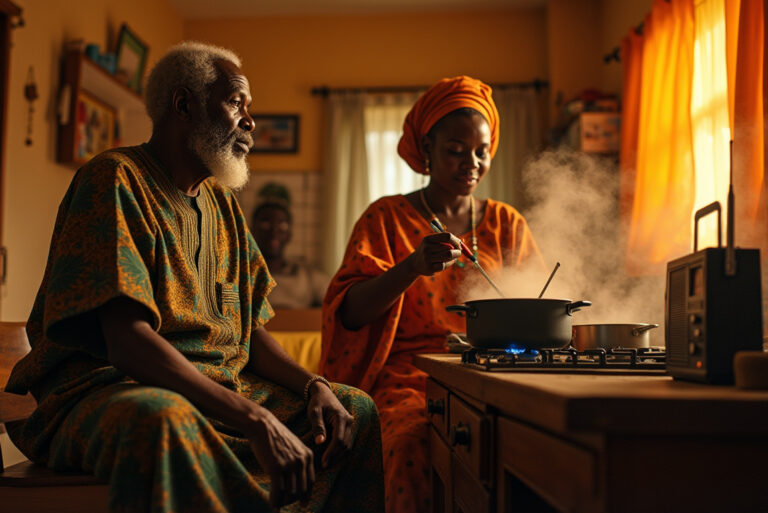Challenging Stereotypes, Claiming Strength, Changing the Narrative Ahead of 2027
The room went quiet when the headline hit the news.
“A woman?” Baba Ajani squinted at the radio like it had insulted his ancestors. “She say she wan run for governor? Again?”
“Yes, Baba,” Funmi replied as she stirred the egusi, steam rising and seasoning filling the kitchen with richness. “And I hope more women join her this time. We don’t just need votes. We need names on the ballot.”
“No be say woman no sabi talk,” Baba said, rubbing his jaw. “But this na politics. Na war. You fit carry powder go battlefield?”
Dele snorted from the living room. “And all the men wey dey lead now, na gladiators? Baba abeg.”
Funmi turned down the gas and looked her father in the eye. “You always say you want change. But when women rise to give it, you start to ask how they look, who they marry, and whether they sabi cook.”
Silence. Only the bubbling of the soup remained.
This is the tension that greets many Nigerian women the moment they dare to dream of public office.
It’s not about qualifications. It’s not about capability. It’s about gendered expectations that reduce vision to vanity and ambition to arrogance.
Take Funke Akindele, for example.
An award-winning actress, filmmaker, and businesswoman with a nationwide following, she made headlines when she declared her candidacy for deputy governor of Lagos State in 2023. Her films had tackled social issues. Her brand had built jobs. Her leadership had inspired millions.
But the minute she entered the political arena, everything changed.
Instead of asking about her manifesto, many asked about her past. Instead of analysing her competence, they questioned her appearance, her divorce, her career path.
“She’s just an actress.” “She’s not serious.” “She wants attention.”
Suddenly, years of achievement were dismissed. The same Nigeria that had celebrated her on screen couldn’t picture her on the ballot.
And yet, what Funke Akindele attempted was groundbreaking. She disrupted the norm. She dared to say, “I am not just here to entertain. I am here to lead.” And in doing so, she became more than a candidate. She became a symbol.
Her story is not isolated. It is a reflection of what happens when women contest. The scrutiny is sharper. The backlash is louder. But the impact is bigger.
The 2027 elections must not just be about choosing the next leader. They must be about expanding who gets to lead at all.
Across Nigeria, more women are rising, not just to vote or protest, but to contest. They are stepping forward, not as substitutes, but as serious contenders. They are not asking for favours. They are asking for fairness.
And every time one woman contests, she opens a door for others. Every poster, every campaign, every town hall meeting with a woman standing at the front instead of seated at the back changes the narrative just a little more.
Yet the path remains steep.
It takes courage to contest. It takes support to win. Women need access to funding, to political mentorship, to security, to fair media representation. Too often, their campaigns are treated as novelties, their press coverage reduced to fashion commentary and family status updates.
Meanwhile, their male counterparts are allowed to be flawed, to fail and rise again. A man with a messy past is called experienced. A woman with a spotless record is called lucky.
But Funmi and her friends are not discouraged. They are fired up. They’ve turned their WhatsApp group into a mobilisation hub. They are encouraging market women, schoolteachers, journalists, tech entrepreneurs and community organisers to pick up nomination forms, attend party meetings, build coalitions.
Because they know that representation is not magic. It is math. The more women run, the more women win.
And they are not just preparing for 2027 as voters. They are preparing as candidates, campaigners, speechwriters, fundraisers, poll agents. They are building networks across wards, across religions, across party lines. They are learning from women who came before them, from Funke, from Dora, from Oby, from all the women whose ambition lit a spark even if the system tried to snuff it out.
They are rewriting the story of Nigerian politics, one declaration at a time.
To get there, Nigeria must also play its part.
Laws must change to enforce and expand gender quotas. Political parties must stop pushing women to the back and then blaming them for low participation. The media must do better in how it frames women in power. Traditional institutions and religious platforms must become spaces of encouragement, not resistance.
Parents must raise daughters who see leadership as normal and sons who see equality as strength.
If we want transformation, we cannot keep recycling the same voices. We must invite fresh ones. Loud ones. Female ones.
So as 2027 approaches, let this be the call:
Not just to vote. Not just to support.
To contest.
To lead.
To own the space.
This time, we want more than campaign jingles and pink t-shirts. We want manifestos that reflect all of us. We want cabinets that look like the country. We want policy, not pity.
We want women on the ballot. And we want them to win.
Because Nigeria cannot move forward while half its population is still being told to wait their turn.
And because the future we want cannot be built by voices we refuse to hear.
Funmi is watching. So are millions of girls like her. Let them see women rise. Let them know it is possible. Let them believe that power does not belong to a gender. It belongs to those who show up and claim it.
2027 is coming.
Let women come with it.





